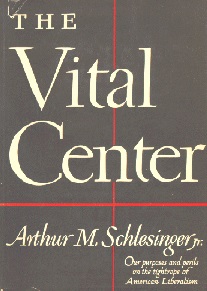 First edition | |
| Author | Arthur Schlesinger, Jr. |
|---|---|
| Cover artist | Samuel Hanks Bryant |
| Language | English |
| Genre | Non-fiction |
| Publisher | Houghton Mifflin |
Publication date | 1948 |
| Publication place | United States |
The Vital Center: The Politics of Freedom is a 1949 book by Harvard historian Arthur Schlesinger, Jr. It defends liberal democracy and a state-regulated market economy against the totalitarianism of communism and fascism.